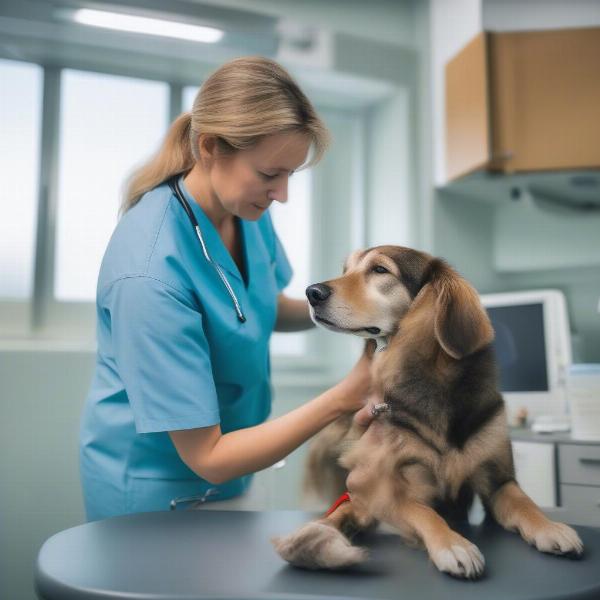After surgery, it’s common for dogs to whine. This can be distressing for both you and your furry friend. Understanding the reasons behind this behavior and knowing how to manage it effectively is crucial for a smooth recovery. This article will guide you through the common causes of post-operative whining, offer practical tips for soothing your dog, and highlight when to seek veterinary attention.
Why is My Dog Whining After Surgery?
Post-surgical whining can stem from a variety of factors, often intertwined. Pain is the most obvious culprit. Even with pain medication, your dog might experience discomfort as the anesthesia wears off and the surgical site begins to heal. Disorientation and anxiety are also common, as the unfamiliar environment of a veterinary clinic and the effects of anesthesia can leave your dog feeling confused and insecure. Furthermore, restricted movement and confinement due to recovery protocols can lead to frustration and whining.
Managing Your Dog’s Post-Operative Whining
Creating a calm and comfortable recovery environment is paramount. A quiet, dimly lit space with a soft bed can help reduce anxiety. Make sure your dog has easy access to water and follow your vet’s instructions regarding food. Gentle petting and a soothing voice can also provide comfort. Distraction techniques, such as offering a safe chew toy or playing calming music, can help redirect your dog’s focus away from the discomfort. dog ears after tummy tuck photos
Pain Management is Key
Administer pain medication as prescribed by your veterinarian. Do not give your dog any human pain relievers, as many are toxic to animals. Regularly monitor the surgical site for any signs of infection, such as swelling, redness, or discharge. If you notice any changes, contact your vet immediately. infected swollen spay incision dog
When to Seek Veterinary Attention
While some whining is expected, excessive or escalating whining, coupled with other symptoms such as lethargy, loss of appetite, or vomiting, could indicate complications. If your dog’s whining seems unusual or concerning, it’s essential to consult your veterinarian. They can assess your dog’s condition and determine if further intervention is necessary. dog ate toothpick
Understanding Your Dog’s Body Language
Pay attention to your dog’s body language. While whining is a vocal cue, other signs like restlessness, panting, trembling, or excessive licking of the surgical site can also indicate pain or discomfort. Learning to interpret these signals will help you better understand your dog’s needs.
 Dog Post-Surgery Checkup at the Vet
Dog Post-Surgery Checkup at the Vet
Conclusion
Dog whining after surgery is a common occurrence, often due to pain, anxiety, and disorientation. By creating a comfortable environment, managing pain effectively, and monitoring for any unusual symptoms, you can help your furry companion navigate the recovery period smoothly. Don’t hesitate to contact your veterinarian if you have any concerns about your dog’s post-operative behavior. dog fractured rib Remember, patience and understanding are key to supporting your dog through this healing process. silica gel ingestion dog
FAQ
- How long is it normal for a dog to whine after surgery? Some whining is expected for a few days, but it should gradually decrease as the dog heals.
- Can I give my dog human pain medication? No, never give your dog human medication without consulting your veterinarian. Many human pain relievers are toxic to dogs.
- What should I do if my dog won’t eat after surgery? Consult your vet, as loss of appetite can indicate a problem.
- How can I make my dog more comfortable after surgery? Provide a quiet, comfortable space, gentle petting, and follow your vet’s instructions for pain medication and activity restrictions.
- When should I be concerned about my dog’s whining? If the whining is excessive, escalating, or accompanied by other symptoms like lethargy or vomiting, contact your veterinarian.
- Is it normal for my dog to be lethargic after surgery? Some lethargy is normal, but excessive lethargy should be checked by a vet.
- What are the signs of infection at the surgical site? Swelling, redness, discharge, and increased warmth are potential signs of infection.
ILM Dog is your trusted partner in providing comprehensive information and resources for dog owners worldwide. We offer expert advice on various aspects of dog care, from breed selection and health to training and nutrition. Whether you’re a seasoned dog owner or just starting your journey, ILM Dog is here to support you. Contact us at [email protected] or +44 20-3965-8624 for personalized guidance and support.